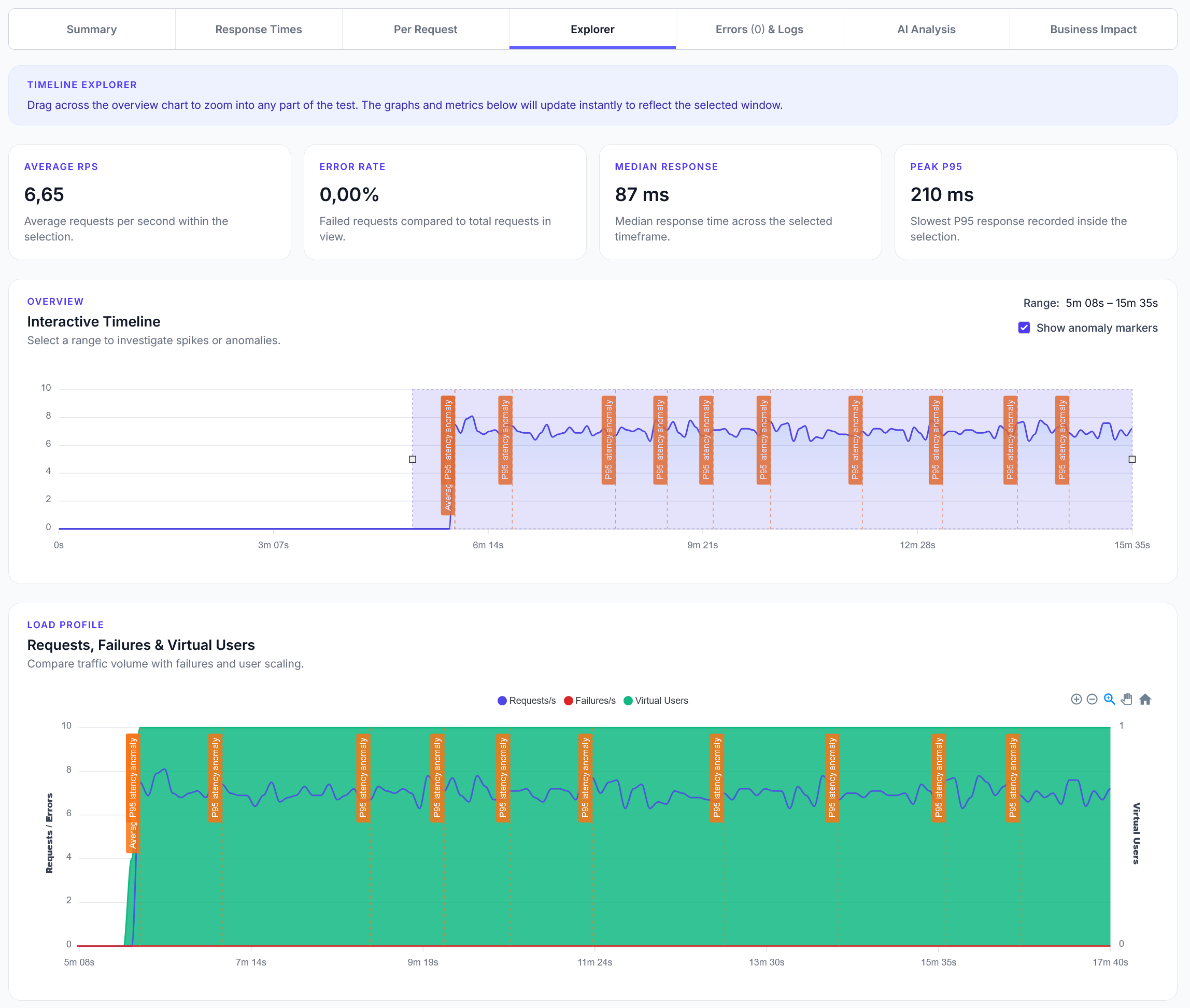
Explorer reports addition
We have added a new Explorer feature to reports, with a timeline scrubber and easy anomaly detection.
Basic API key authentication testing with header and query methods
LoadForge can record your browser, graphically build tests, scan your site with a wizard and more. Sign up now to run your first test.
This guide shows how to test APIs that use API key authentication. Perfect for testing different API key placement methods and validation.
from locust import task, HttpUser
import random
class APIKeyTestUser(HttpUser):
def on_start(self):
# API keys for testing (replace with your actual keys)
self.valid_key = "sk-1234567890abcdef"
self.invalid_key = "invalid-key-12345"
# API endpoints that require authentication
self.endpoints = ["/api/users", "/api/data", "/api/reports"]
@task(4)
def test_header_api_key(self):
"""Test API key in header (X-API-Key: your-key)"""
endpoint = random.choice(self.endpoints)
headers = {
"X-API-Key": self.valid_key,
"Content-Type": "application/json"
}
with self.client.get(
endpoint,
headers=headers,
name="Header API Key"
) as response:
if response.status_code == 200:
print(f"Header API key success: {endpoint}")
elif response.status_code == 401:
response.failure("Valid API key rejected")
else:
response.failure(f"Unexpected response: {response.status_code}")
@task(3)
def test_bearer_token_api_key(self):
"""Test API key as Bearer token (Authorization: Bearer your-key)"""
endpoint = random.choice(self.endpoints)
headers = {
"Authorization": f"Bearer {self.valid_key}",
"Content-Type": "application/json"
}
with self.client.get(
endpoint,
headers=headers,
name="Bearer Token API Key"
) as response:
if response.status_code == 200:
print(f"Bearer token success: {endpoint}")
elif response.status_code == 401:
response.failure("Valid bearer token rejected")
else:
response.failure(f"Unexpected response: {response.status_code}")
@task(3)
def test_query_parameter_api_key(self):
"""Test API key in query parameter (?api_key=your-key)"""
endpoint = random.choice(self.endpoints)
params = {"api_key": self.valid_key}
with self.client.get(
endpoint,
params=params,
name="Query Parameter API Key"
) as response:
if response.status_code == 200:
print(f"Query parameter success: {endpoint}")
elif response.status_code == 401:
response.failure("Valid API key in query rejected")
else:
response.failure(f"Unexpected response: {response.status_code}")
@task(2)
def test_invalid_api_key(self):
"""Test with invalid API key"""
endpoint = random.choice(self.endpoints)
headers = {
"X-API-Key": self.invalid_key,
"Content-Type": "application/json"
}
with self.client.get(
endpoint,
headers=headers,
name="Invalid API Key"
) as response:
if response.status_code == 401:
print(f"Invalid API key correctly rejected: {endpoint}")
elif response.status_code == 200:
response.failure("Invalid API key was accepted")
else:
print(f"Invalid API key returned {response.status_code}")
@task(1)
def test_missing_api_key(self):
"""Test request without API key"""
endpoint = random.choice(self.endpoints)
with self.client.get(
endpoint,
name="Missing API Key"
) as response:
if response.status_code == 401:
print(f"Missing API key correctly rejected: {endpoint}")
elif response.status_code == 200:
response.failure("Request without API key was accepted")
else:
print(f"Missing API key returned {response.status_code}")
self.valid_key with your actual API keyself.invalid_key with a test invalid keyself.endpoints with your actual API endpoints